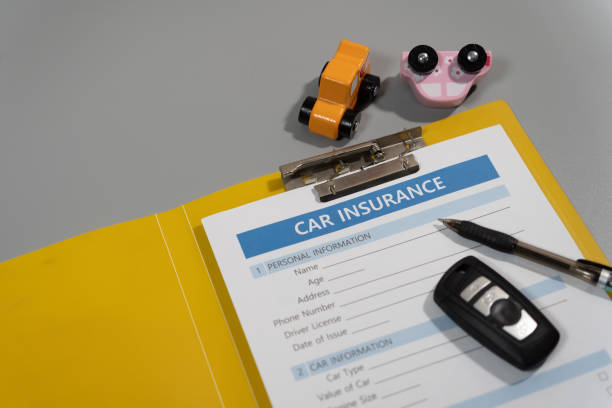Introduction
When you see the premium quotes, it may seem overwhelming when you are getting your first car insurance policy. Novice drivers face a different challenge that includes higher premiums, complicated insurance policies, and insurance terms that are strange.
However, by knowing the fundamentals and where to seek some savings, you can ensure that you can get cheap insurance coverage and be within the law on the road.
This guide simplifies all that is required to be known by new drivers concerning car insurance, including the coverage types on the one hand, and the best deals on the other.
These are insights that will help you make effective decisions, whether at 16 or 26, that will safeguard your wallet and future.
Understanding Car Insurance Basics

Before diving into specific tips, let’s clarify the essential coverage types you’ll encounter:
And to get into a bit more detail on the tips, it would be good to define the types of coverage essential to you:
- Liability Coverage is provided in case of an accident on your part. They pay their health costs and property loss, and it is mandatory in the majority of states. This insurance will not repair the car in your hands, but it will provide you with a safety net in case you are in the wrong.
- Collision Coverage is the one that covers the cost of repairing or replacing your vehicle in case of an accident, who is at fault. In case you are leasing or financing your vehicle, your lender will most probably insist on such coverage.
- Comprehensive Coverage is a non-collision damage coverage, such as theft, vandalism, hail damage, or hitting a deer. It is commonly used with collision coverage, and it could also be mandatory for lenders.
These basics will allow you to judge policies in a better way. Your monthly or annual premium is what you are paying, and your deductible is what you are paying out of pocket before you become covered.
The higher is your deductible, the lower the premiums you will pay; however, you must ensure that you can afford the deductible amount that you are required to pay should you get a claim.
What Affects Your Insurance Rates
The amount you pay in car insurance is determined by a number of factors which can be known to make you make strategic decisions.
Age and Experience: The greatest effect on your rates is Age and Experience. The teen drivers are the ones who attract the highest premiums since they are more prone to accidents.
As per industry statistics, an average female aged 17 years costs an average of $6,410 annually on car insurance, and a male costs an average of $7,377 per year. At the age of 25, the averages become lower to 2387 dollars among females and to 2526 dollars among males.
Your driving Record is very important after you begin to create one. The average annual premium increase by a single speeding ticket is 435. This is because of keeping down the costs in the long run by keeping a clean record.
Vehicle Type is also an important factor. Sports cars and luxury vehicles are expensive to insure as compared to practical sedans or SUVs. When buying a car, consider insurance expenses when you are deciding on which car to buy.
Location affects rates too. The very high rates usually reflect the risk of accidents and theft in urban areas and lower rates in rural areas.
Money-Saving Tips for New Drivers

Finish a Defensive Driving School
Numerous insurers provide incentives for taking approved defensive driving courses. The course was priced at 75 dollars, hence she only had to spend three months to recover her investment.
Get Good Grades to have Discounts for students
As a student, your GPA will have a direct effect on your insurance expenses. The average or higher student discounts are good and are being offered to most insurers. Jake is a college sophomore who is offered a discount of 15% on his policy in order to maintain his grades, and this would help him save almost 400 dollars annually.
Take into account Usage-Based Insurance
Provided that you do not drive very often, the use-based insurance programs can save you a significant amount of money. These applications track your driving and miles using smartphone applications or plug-in gadgets. Emma, a college student who drives on weekends and holidays only, saved 25% of her premium due to a usage-based program by her insurer.
Bundle Your Policies
When car insurance is combined with renters insurance, it tends to prompt bundling discounts. It might seem that you live in a dorm, but even in this case, you are insured by renters insurance, which costs usually no more than 1020 a month and covers your belongings. The bundling discount is usually more than the extra policy cost.
Top Affordable Insurance Options
According to the industry analysis, several insurers always provide new drivers with good rates:
Only Erie is particularly low in its sample rates of teen drivers, and its premiums are about 2,900-3,000 lower than the national averages. Nevertheless, Erie is a new company that operates in 13 states and Washington, D.C.
Auto-Owners is the lowest-rate teen company and is in 26 states with independent agents. Their personal services usually attract families that require help in taking them through the insurance journey.
USAA has very good rates but it is limited to military families and veterans. Their teen rates and young adult rates are some of the most competitive rates they offer as long as you qualify.
Geico offers coverage across the country with 23-26 percent lower than average rates of teen drivers. Younger drivers are attracted to their digital-first attitude and wide variety of discounts.
Compare different insurers when there is an option of choice. The difference in rates may be significant, even thousands of dollars each year of identical coverage.
Learning about New Driving Prohibitions

New drivers may be subjected to other legal restrictions other than insurance mandates. Gradated licensing programs are used by most states with certain restrictions:
Nighttime Driving Restrictions usually forbid new drivers during the hours between 11 PM and 5 AM, but specific hours depend on the state.
The restriction on Passenger Limitations is usually on the number of non-family passengers that non-family drivers can carry, such as other teens.
The restrictions on cell phone use apply more to a new driver. A large number of states prohibit any form of cell phone use by drivers below the age of 18, including hands-free devices.
These limitations are not mere laws; the consequences of breaking them may affect your insurance plans and premiums. Ensure that you are conversant with your state rules and observe them strictly.
Common Insurance Mistakes to Avoid
Drivers who are new usually commit expensive mistakes when buying insurance. Avoid these common pitfalls:
Do not simply select the lowest cost policy without checking the cover limits. State minimum requirements might fail to offer proper protection during grave accidents.
Do not be tempted to provide misleading information in your application. Accusing yourself as the main driver of an older and cheaper car when in reality you are driving a sports car every single day is insurance fraud and can deprive you of coverage at the time when you need it the most.
Discount opportunities should not be overlooked. Check any discounts offered every year, because depending on grades, driving history or life situation, you may or may not be eligible.
Frequently Asked Questions
Q: What is the importance of car insurance in new drivers?
A: Car insurance is mandatory in the majority of states, and it offers an important financial security. The inexperience of new drivers is an even greater risk factor because they are at a greater risk of accidents, which thus makes insurance even more necessary. Even one accident would leave the individual with thousands of dollars in personal liability without coverage.
Q: What do new drivers do to reduce their car insurance rates?
One of the ways in which new drivers can save money is by offering good student deals, by taking defensive driving classes, using usage-based insurance, keeping a clean driving record, and getting multiple quotes. Premiums can also be reduced by means of bundling policies and selecting larger deductibles.
Q: What is kind of car insurance cover that new drivers require?
A: At least, the new drivers should have the liability coverage that is stipulated by the laws of a state. In case of financing a vehicle, collision and comprehensive coverage are usually necessary. Uncovered motorist insurance may be another form of insurance that we ought to think about to protect ourselves against uninsured motorists.
Q: Which insurance companies provide the best rates of new drivers?
A: Erie, Auto-Owners, USAA, and Geico always have good rates to new drivers. Nevertheless, the optimal alternative depends on personal conditions, place of location, and existing discounts. Quotes should be obtained with two or more insurers at all times.
Making Smart Insurance Decisions
Car insurance is a huge cost to inexperienced drivers, yet it is necessary insurance that gets cheaper as time and experience go.
Raise your concentration on the creation of a clean driving record, using whatever sorts of discount offers available and shopping on better rates frequently as your condition fluctuates.
It is worth bearing in mind that the least expensive policy does not necessarily make it the best value. Look at coverage limits, reputation of customer service, and financial stability in selecting an insurer. Get coverage that fits your needs as you grow.
Above all, consider car insurance as a financial security investment. The appropriate policy is not only covers your car, but also your future income capability and holdings. You should take time to learn what you have to choose and ask questions to make informed choices that will benefit you in the long run.
Conclusion
The price of insurance and the options of the coverage differ according to personal situation and place. Use individual advice by consulting with a licensed insurance agent.
The presented information is purely in general guidelines, and it cannot be regarded as a substitute of professional financial or legal advice.
We are not one of the insurance companies listed and do not specify particular providers. The readers are motivated to do their research and compare the options.












Add Comment